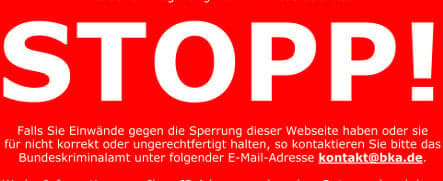German ISPs blocking child porn sites

The German government has signed agreements with key internet service providers (ISP’s) to block access to child porn sites, Family Minister Ursula von der Leyen said on Friday.
Internet users hoping to download child porn will instead be met with a large red "stop" sign, warning of the impact of paedophilia on the victims.
Police will transfer a daily-updated list of roughly 1,500 sites containing illegal material to the service providers, the minister said, adding that she hoped up to 450,000 hits every day could be blocked with this method.
People aiming to access these sites will not have their personal data or IP address recorded.
Von der Leyen stressed that blocking access to these sites "is only a building block in the fight against child pornography."
"Prosecuting the perpetrators... and protecting the victims is still the highest priority," the minister said. The ISP providers that signed the deal - including Deutsche Telekom and Vodafone Deutschland - represent around 75 percent of the German market.
Other countries including Britain, Canada, New Zealand, Norway, South Korea and Sweden have already introduced similar schemes successfully, the ministry said.
Responding to critics who said the measures amounted to censorship of the Internet, the ministry said: "It is not about restricting freedoms... it is about protecting the dignity of individuals and children."
On Thursday, German police said they had smashed an international child porn ring of some 9,000 suspected paedophiles in 92 countries.
Pornographic images of children were transmitted from more than 1,000 connections in Germany to 8,000 IP addresses in countries including Austria, Canada, New Zealand, Switzerland and the United States.
The footage included "images of the most serious sexual abuse, even of toddlers," police in the southwestern state of Baden-Württemberg said.
Von der Leyen, a mother of seven, has made fighting child pornography a special priority in recent months. She enlisted the help of top lawmakers and Europol to hammer out changes to the telecommunications legislation that would implement the obligatory blocking of websites in addition to the existing bans on child pornography. The German cabinet approved the new ISP law in late March.
The law incorporates the use of the CIRCAMP system, developed in Norway in 2004, which blocks entry to known child pornography sites with a red stop sign graphic and a message. So far nine European countries use the system, among them the Netherlands, Denmark, Belgium, Switzerland, and the United Kingdom.
But the names of those who attempt to view the sites are not logged and people are also still able to access child porn from internet sites abroad – a fact that has fuelled criticism from internet industry experts who say tech-savvy users can find ways around the block.
Meanwhile data protection advocates say the block could lead to other censorship in the future. And law enforcement is also doubtful that the law will be enough.
Comments
See Also
Internet users hoping to download child porn will instead be met with a large red "stop" sign, warning of the impact of paedophilia on the victims.
Police will transfer a daily-updated list of roughly 1,500 sites containing illegal material to the service providers, the minister said, adding that she hoped up to 450,000 hits every day could be blocked with this method.
People aiming to access these sites will not have their personal data or IP address recorded.
Von der Leyen stressed that blocking access to these sites "is only a building block in the fight against child pornography."
"Prosecuting the perpetrators... and protecting the victims is still the highest priority," the minister said. The ISP providers that signed the deal - including Deutsche Telekom and Vodafone Deutschland - represent around 75 percent of the German market.
Other countries including Britain, Canada, New Zealand, Norway, South Korea and Sweden have already introduced similar schemes successfully, the ministry said.
Responding to critics who said the measures amounted to censorship of the Internet, the ministry said: "It is not about restricting freedoms... it is about protecting the dignity of individuals and children."
On Thursday, German police said they had smashed an international child porn ring of some 9,000 suspected paedophiles in 92 countries.
Pornographic images of children were transmitted from more than 1,000 connections in Germany to 8,000 IP addresses in countries including Austria, Canada, New Zealand, Switzerland and the United States.
The footage included "images of the most serious sexual abuse, even of toddlers," police in the southwestern state of Baden-Württemberg said.
Von der Leyen, a mother of seven, has made fighting child pornography a special priority in recent months. She enlisted the help of top lawmakers and Europol to hammer out changes to the telecommunications legislation that would implement the obligatory blocking of websites in addition to the existing bans on child pornography. The German cabinet approved the new ISP law in late March.
The law incorporates the use of the CIRCAMP system, developed in Norway in 2004, which blocks entry to known child pornography sites with a red stop sign graphic and a message. So far nine European countries use the system, among them the Netherlands, Denmark, Belgium, Switzerland, and the United Kingdom.
But the names of those who attempt to view the sites are not logged and people are also still able to access child porn from internet sites abroad – a fact that has fuelled criticism from internet industry experts who say tech-savvy users can find ways around the block.
Meanwhile data protection advocates say the block could lead to other censorship in the future. And law enforcement is also doubtful that the law will be enough.
Join the conversation in our comments section below. Share your own views and experience and if you have a question or suggestion for our journalists then email us at [email protected].
Please keep comments civil, constructive and on topic – and make sure to read our terms of use before getting involved.
Please log in here to leave a comment.